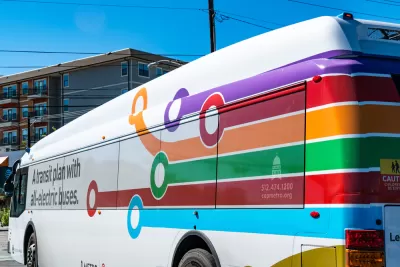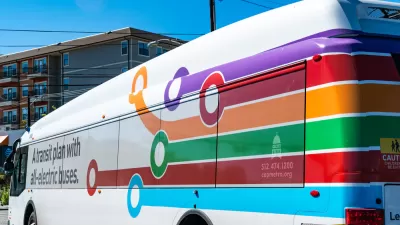Increasing costs and an understanding about taxes are reducing the scope of the long-term transit plan in Austin, Texas.

[Updated March 3, 2023]
Project Connect, a long-term transit plan approved by Austin voters in November 2020, is being whittled down as ambition falters on increasing cots.
Asher Price reports for Axios that the Austin Transit Partnership, established by the city of Austin and Capital Metro (CapMetro) to design, finance, and build Project Connect, is exploring options to reconfigured transit plans after cost estimates for two light rail lines jumped from $5.8 billion to $10.3 billion. Real estate prices from the lines increased from $250 million to $1.19 billion and cost estimates for a downtown subway tunnel jumped from $2 billion to $4.1 billion.
"Transit planners have a 'working expectation' of no new tax increases, a Project Connect program officer wrote in the memo addressed to the Austin City Council and the board of transportation agency Cap Metro," explains Price in the article.
Project Connect was one of the headlining wins for public transit during the November 2020 election, but astute observers will recall that the scope of Project Connect budget was already cut by a third before ever appearing on the ballot. The source article below also reports that planned bridge crossings acros Lady Bird Lake could also be reduced from two to one.
FULL STORY: Amid high costs, officials re-examining Austin transit plans

Planetizen Federal Action Tracker
A weekly monitor of how Trump’s orders and actions are impacting planners and planning in America.

Maui's Vacation Rental Debate Turns Ugly
Verbal attacks, misinformation campaigns and fistfights plague a high-stakes debate to convert thousands of vacation rentals into long-term housing.

San Francisco Suspends Traffic Calming Amidst Record Deaths
Citing “a challenging fiscal landscape,” the city will cease the program on the heels of 42 traffic deaths, including 24 pedestrians.

Amtrak Rolls Out New Orleans to Alabama “Mardi Gras” Train
The new service will operate morning and evening departures between Mobile and New Orleans.

The Subversive Car-Free Guide to Trump's Great American Road Trip
Car-free ways to access Chicagoland’s best tourist attractions.

San Antonio and Austin are Fusing Into one Massive Megaregion
The region spanning the two central Texas cities is growing fast, posing challenges for local infrastructure and water supplies.
Urban Design for Planners 1: Software Tools
This six-course series explores essential urban design concepts using open source software and equips planners with the tools they need to participate fully in the urban design process.
Planning for Universal Design
Learn the tools for implementing Universal Design in planning regulations.
Heyer Gruel & Associates PA
JM Goldson LLC
Custer County Colorado
City of Camden Redevelopment Agency
City of Astoria
Transportation Research & Education Center (TREC) at Portland State University
Jefferson Parish Government
Camden Redevelopment Agency
City of Claremont




























